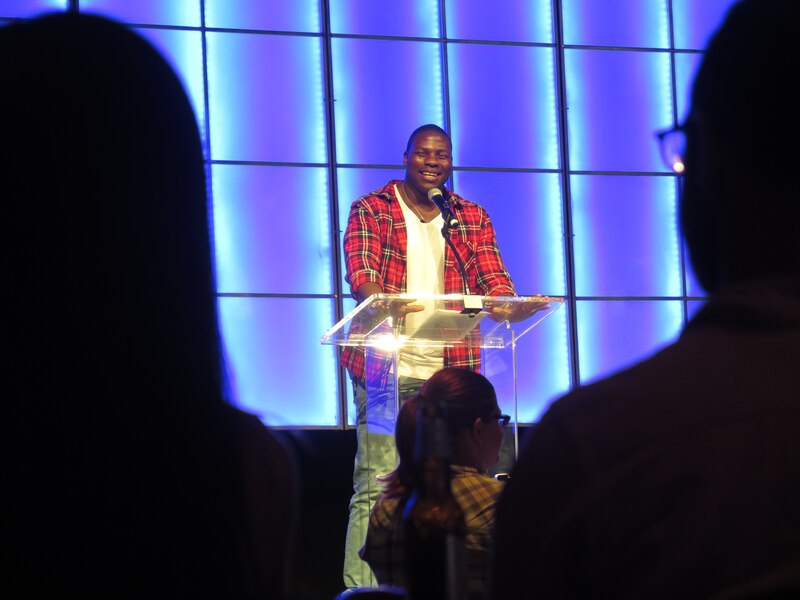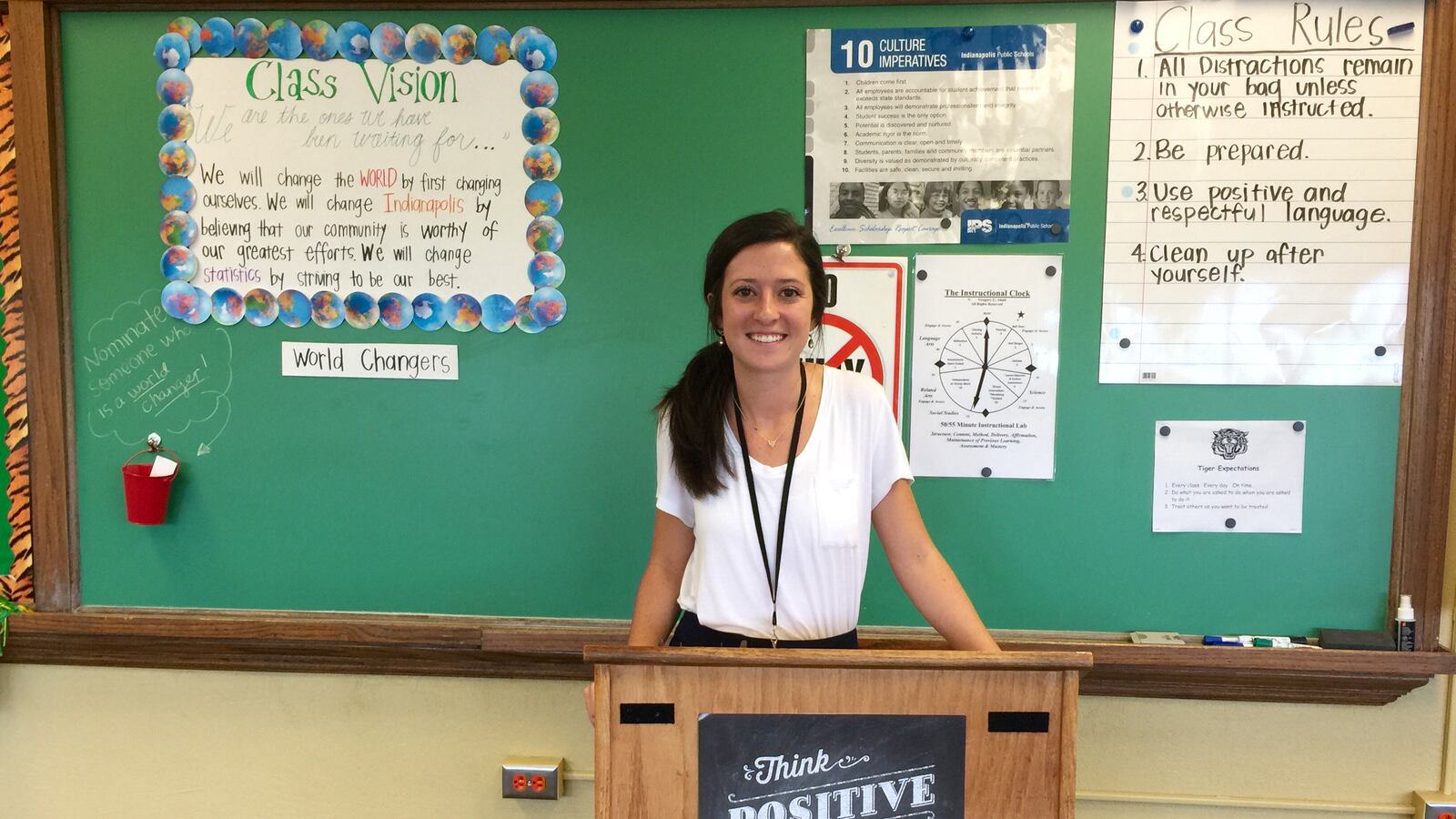The first challenge for new social studies teacher Morgan Cooksey at Crispus Attucks High School, fresh out of college and face-to-face with as many as 30 teenagers at a time, was harder than she expected — just getting them to learn her name.
Like many who are placed in classrooms around the country by Teach For America, Cooksey was a standout college student, but her only teacher training was during a five-week institute this summer.
“Miss…miss…miss…” a student shouted as he waved his hand in the air to get Cooksey’s attention.
“What’s my name?” Cooksey said, glaring at him.
“Man, I don’t know,” the boy said.
“You can call me Miss C,” Cooksey said.
It was just after 9 a.m. on the third day of school and Cooksey was trying to explain to her third class of the day the rules of a game called “Heads Up Charades.” One person in each group of five or six students gets a stack of cards, each with one word written on it, stands up in front of the group and places the card on their forehead. Only the group knows the word and they have to help the cardholder guess it without saying it.
The words ranged from history terms such as Martin Luther King Jr. and the Emancipation Proclamation to fun terms such as Beyoncé and Twitter. The goal was to test the students’ knowledge. Did they know what they should know by 11th grade?
Cooksey’s name wasn’t the only one they were having trouble with.
One student’s card had the name “Mike Pence” on it. The group was silent.
“Mike, who?” one girl said.
They wanted to skip to the next card.
“You guys should know this one,” Cooksey said as she rubbed her chin. “He’s the governor.”
There’s a lot of work ahead for Cooksey in Room 321.
A program that aims to fill gaps
In a way, Cooksey lucked out. Although Teach For America placed her in the lowest-rated school district in central Indiana, Indianapolis Public Schools, she landed in the district’s lone A-rated high school.
Based in New York City, Teach For America was the brainchild of Wendy Kopp, who, as a student at Princeton University in the early 1990s, proposed the idea of a national service for recent college graduates by teaching in needy schools. The group asks top graduates, and now applicants who want to change careers, to commit to two years of teaching and assigns them to schools across the country that face high poverty and other barriers to learning.
The organization only came to Indianapolis in 2008. When districts like IPS have trouble filling jobs, as they did this summer, TFA helps fill the gap.
“In Indianapolis, especially in Center Township where we place because it’s the highest concentration of poverty, people are not filling these teacher vacancies,” said Rebecca Thompson Boyle, the Indianapolis executive director. “People are not choosing to teach in our lowest-income communities, which is unfortunate and a problem.”
The hope is many of the teachers will stay in teaching as a permanent job. Of the 381 Indianapolis alumni, about 56 percent still work in a K-12 school, according to TFA.
All told, 61 TFA teachers are assigned to IPS schools this year, while others are teaching in charter schools. That includes 33 first-year TFA teachers in IPS schools, among 85 total newcomers in Indiana. For high schools, they mostly are assigned to Arsenal Tech and George Washington. Cooksey was the only one placed at Crispus Attucks.
Crispus Attucks is a historic school. It was the city’s famed first all-black high school, producing basketball superstar Oscar Robertson, congresswoman Julia Carson and several famous musicians among its many well-known alumni. The school integrated in 1967, then became a middle school in 1986 before being reborn as a medical magnet high school in 2006.
The transformation was a success. Crispus Attucks earned an A on its last three state report cards. Even so, Cooksey quickly found her job wasn’t going to be easy.
The ‘blurry’ five weeks of training
Cooksey was on track for law school, but the idea of sitting behind a desk all day scared her.
She wasn’t sure she had a passion for it. So when a mentor pushed her to apply for TFA, she changed course. She graduated in May, joined up with the program and was off for five weeks of intensive training at the University of Tulsa in Oklahoma. The political science major with no prior formal training in education was a teacher.
“I never saw myself in front of the classroom,” Cooksey said during TFA’s back to school kickoff event in July. “But the more and more I learned about teaching, the more and more I realized, I think, I would love it.”

She graduated near the top of her class from the University of Louisville, 118 miles down I-65. Now she’s teaching five U.S. history classes and a history of medicine class from 7:30 a.m. to just after 1 p.m. Monday through Friday.
During the training institute in Tulsa, where the aspiring teachers took part in social justice seminars and seminars in their subject areas, they were also assigned a summer school class to teach. Cooksey’s assignment was to teach Algebra I, pretty far afield for a social studies teacher with a political science background.
“Honestly, something I didn’t anticipate was my lack of knowledge being a big strength for me in the classroom,” Cooksey said. “As I was lesson planning, I was re-learning the material. So I would go through and solve a problem and I would say, ‘OK, I got confused at points A and B, so my students will probably misunderstand that as well.’”
It was sometimes difficult and humbling. She often asked herself “Why am I even doing all of this?” But after five weeks, she felt at home in the classroom, she said.
“The work is hard, yes,” she wrote in a journal during training. “But the smile on a student’s face when they pass the state standardized test for Algebra 1 after failing twice before is absolutely worth it. No paycheck or bonus compares to witnessing the joy of a successful student.”
The training continues with classes two nights a week at Marian University. Cooksey will earn a master’s degree in education by the end of her two years.
Is the training enough?
Organizations like Teach For America have come under fire for placing too little value on traditional methods of teacher training, like student teaching and a college major that includes instruction in how to teach, not just what to know.
Teresa Meredith, president of the Indiana State Teacher’s Association, argues TFA isn’t filling a void, it’s creating one by bringing in temporary teachers, many of whom don’t plan to make it a career.
“The fact that they don’t stay is a big problem,” Meredith said. “They create challenges in the schools that they’re in. Whether they’re there for one year, two years or three years, there is no stability, and for kids in at-risk communities, the most stable thing they have is school.”
Meredith said she appreciates the desire to help, but she sees TFA as a dangerous short cut, even as the organization has beefed up its training and support for teachers in the classroom.
“They’re doing some other things once folks are in the trenches,” Meredith said. “But that’s not enough.”
Thompson Boyle, however, said the critics aren’t always up-to-date on the many changes the organization has made to its training, relying on old or ill-informed arguments.
“When I do hear those negatives, it’s from a variety of sources. I don’t think it’s organized,” she said. “I’ve heard it from veteran teachers. I’ve heard it from legislators. I’ve heard it from people who assume we’re anti-union.”
It’s certainly true TFA teachers don’t have as much preparation time as those who are traditionally trained, she said.
“That’s fair,” Thompson Boyle said. “It is condensed. It is short. They certainly aren’t getting the pedagogy that folks are getting in a four-year traditional training program. But they are getting incredible amounts of professional development throughout their first two years that other new teachers that have gone through traditional programs are not getting.”
Each teacher is assigned a mentor, who Thompson Boyle said visits their class every couple of weeks to evaluate them. TFA Indianapolis also hosts “professional Saturdays” four times a year, which serves as an opportunity for members to enhance their teaching and content-area skills.
Most traditionally trained teachers don’t get those opportunities, she said.
Counting down the days
In some ways, Cooksey said, her students were doing better than she anticipated.
But the work was hard enough that she was already counting down the days until the last day of school the first week. Three down, she said after her last class on the third day, 177 to go.
“I was fully prepared to come in and deal with bad students,” she said. “But everyone was nice. They shook my hand. They smiled.”
There have been a lot of surprises.
Cooksey is responsible for more administrative duties than she thought she would be, she said. She has to make sure students have access to their lockers and books and make sure their schedules are in order. She was also assigned afternoon bus duty.
She spent a lot of her preparation time worrying about her teaching style, Cooksey said. Should she start out tough? Or be more friendly?
But the tougher challenge was the culture differences between she and her students, she said. She is white and most of her students are not. That is not something she experienced in school.
“I looked around and realized I am the minority,” she said. “I went to a pretty diverse high school myself, and I’ve always appreciated that, but I’ve never seen that much segregation.”
She found it sometimes helped to be direct about differences.
“If it seems like I have an attitude, I’m sorry,” Cooksey said in response to a student’s criticism of her manner of speech. “I’ll take a step back. Thank you for being real with me.”
The students were receptive to that. Not being much older than her students helps her understand them and make connections.
She doesn’t know what’s next for her or whether she will remain a teacher. But right now, in her classroom, Cooksey is focused on reaching through all of the barriers that could get in the way of her helping her students learn.
“I strive for those relationships,” Cooksey said. “I want to have that open communication with my students. I want them to be able to talk to me.”


